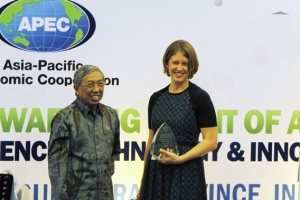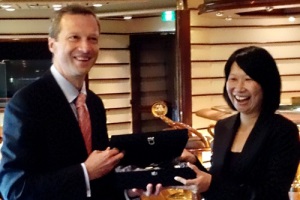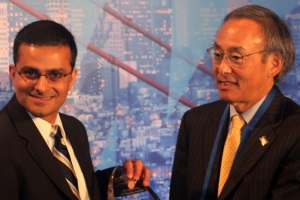Last page update:
The APEC Science Prize for Innovation, Research and Education (“ASPIRE”) is an annual award which recognizes young scientists who have demonstrated a commitment to both excellence in scientific research, as evidenced by scholarly publication, and cooperation with scientists from other APEC member economies.
The ASPIRE Prize supports APEC’s mission to:
- strengthen international science and technology networks;
- enhance economic growth, trade and investment opportunities in harmony with sustainable development, through policies, innovative R&D and technologies, and knowledge sharing; and
- improve linkages and efficiency between research and innovation.
ASPIRE 2014 NOMINATION THEME
Each year the APEC host economy is asked to provide a theme to guide nominations for the ASPIRE Prize to be awarded in their host year. For its host year of 2014 China selects "Intelligent Transportation" as the ASPIRE nominating theme, promoting smart, clean and low-carbon urbanization to enhance the efficiency and effectiveness of APEC's regional connectivity.
Each member economy, through its representative on the APEC Policy Partnership for Science, Technology and Innovation (PPSTI), is invited to nominate one young scientist under the age of 40 to be considered for the 2014 ASPIRE Prize. Nominees should demonstrate excellence in scientific research, as evidenced by scholarly publication, and cooperation with scientists from other APEC member economies in subjects such as: intelligent transport systems, urban planning, traffic engineering, civil engineering, among others.
ELIGIBILITY
Any citizen of an APEC member economy is eligible to be nominated for the ASPIRE Prize. He/she must be living at the time of his/her nomination and be under the age of 40 as of 31 December of that year (i.e., all 2014 nominees must be under the age of 40 as of 31 December 2014).
SELECTION PROCESS
Each member economy, through its representative on the APEC Policy Partnership for Science, Technology and Innovation (PPSTI), is invited to nominate one young scientist under the age of 40 to be considered for the 2014 ASPIRE Prize.
Once nominations are received, PPSTI members rank the nominees through a selection ballot to determine the winner. PPSTI members are asked to judge the nominees based on how well they have demonstrated:
- excellence in scientific research, as evidenced through scholarly publication;
- commitment to cooperation with scientists from other APEC member economies; and
- contribution to the theme selected by that year’s host economy.
ASPIRE PRIZE SPONSORS
Wiley and Elsevier, two of the world’s leading publishers of scholarly scientific knowledge, have generously committed to funding prize money in the amount of $25,000 USD.
ASPIRE PRIZE WINNERS
 |
2013: Dr. Carissa Klein (Australia) Dr. Carissa Klein of Australia was awarded the APEC Science Prize for Innovation, Research and Education (ASPIRE) by Gusti M. Hatta, Indonesia’s Minister of Research and Technology. Dr. Klein’s selection is a result of her research with the University of Queensland that uniquely addresses the issue of sustainable ocean development by striking a balance between biodiversity conservation and socioeconomic viability. Read news release here. |
|
 |
2012: Dr. Rossa Wai Kwun Chiu (Hong Kong, China) Russia selected health innovation as its 2012 ASPIRE nominating theme, building on its desire that APEC actively foster cooperation among economies in major innovation areas, such as human health, to support healthy lifestyles, productivity and economic growth. Dr. Chiu’s groundbreaking research and innovations in chemical pathology has brought non-invasive prenatal diagnosis of fetal genetic diseases into routine clinical use around the world. Read news release here. |
|
 |
2011: Dr. Ali Javey (United States) The United States selected green growth as its ASPIRE nominating theme, building on its desire that APEC actively promote environmentally sustainable economic growth and development, and help economies successfully transition to a clean energy future. Dr. Javey’s innovative work with nanomaterials has made great strides in developing a new generation of solar energy technology and reducing energy consumption in "green electronics." Read news release here. |
|

